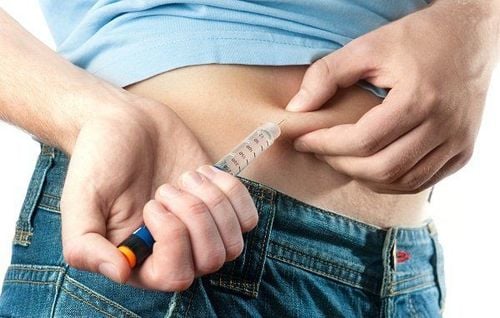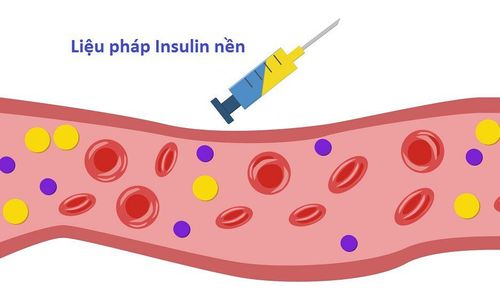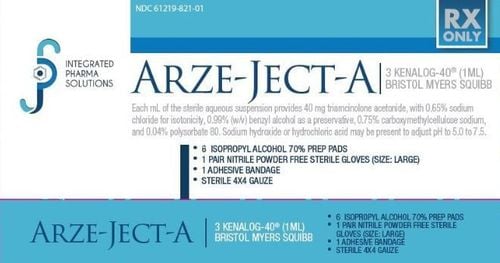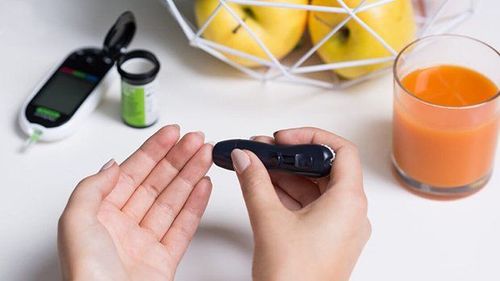This is an automatically translated article.
The article was professionally consulted with General Internal Medicine - Department of Examination & Internal Medicine - Vinmec Nha Trang International General Hospital.Insulin is used in the treatment of type 1 and type 2 diabetes to replace physiological insulin secretion and control blood glucose levels to minimize the risk of hypoglycemia. There are many forms of insulin available on the market with different pharmacokinetic properties and duration of action of different types of insulin.
1. What is insulin?
Insulin is a hormone secreted by the pancreas, whose main function is to bring sugar into cells for energy metabolism. If the patient's blood sugar is higher than normal, insulin will help the body store sugar in the liver and release it when blood sugar is low or when the body needs a lot of sugar (time between meals or when blood sugar is high). do exercise).Therefore, insulin helps balance blood sugar levels, maintaining this sugar level in the normal range. For patients with diabetes, insulin is an indispensable treatment option.
2. Time of action of different types of insulin

Chỉ định sử dụng loại insulin phù hợp nhất phải dựa trên nhiều yếu tố
Instant-acting insulin Short-acting insulin Intermediate-acting insulin Long-acting insulin Mixed insulin (premix) The doctor will assign the patient the most suitable insulin based on the following types of insulin. factors such as: the body's ability to respond to insulin (absorption, duration of action), the patient's lifestyle (eating habits, exercise intensity), willingness to receive injections daily injections, age, frequency of blood glucose testing, and goals for glycemic control.
The duration of action of insulin is divided into sub-criteria: Time of onset (time before insulin enters the bloodstream and begins to lower blood sugar ), time to peak (time to best lower blood sugar) ) and duration of action (how long insulin continues to work).
Specific information about the duration of action when using insulin is as follows:
2.1 Instant-acting insulin Instant-acting insulin will ensure the amount of insulin needed for a meal at the time of injection. This form of insulin is often taken with a longer-acting insulin. Therefore, the patient needs to eat immediately after injecting insulin. Some commonly used immediate-acting insulin preparations are:
Lispro (Humalog): Initiation time is 15 - 30 minutes, time to peak is 30 - 90 minutes, and duration of action is 3 - 5 hours ; Aspart (Novolog): Starting time is 15-20 minutes, peak time is 40-50 minutes, and operation time is 3-5 hours; Glulisine (Apidra): Start time is 20-30 minutes, peak time is 30 - 90 minutes, and duration of action is 1-2 hours 30 minutes. 2.2 Short-acting insulin Short-acting insulin ensures the amount of insulin needed for a meal within a period of 30 - 60 minutes. Some commonly used short-acting insulin preparations are:
Regular(R) or Novolin: Initiation time is 30 minutes - 1 hour, time to peak is 2 - 5 hours, and duration of action is 5 - 8 o'clock; Velosulin (insulin pumped insulin): Initiation time is 30 minutes - 1 hour, peak time is 1-2 hours, and duration of action is 2-3 hours. 2.3 Intermediate-acting insulin Medium-acting insulin provides half-day or overnight insulin needs, often in combination with immediate-acting or short-acting insulin.
The commonly used intermediate-acting insulin preparation is NPH(N) which has an onset time of 1-2 hours, a peak time of 4-12 hours, and a duration of action of 18-24 hours.
2.4 Long-acting insulin This type of insulin does not have a peak time, insulin is secreted at a constant level, ensuring the amount of insulin needed for the whole day (called basal insulin). This form of insulin is often used in combination as needed with immediate-acting or short-acting insulin. Some of the commonly used long-acting insulin preparations today are:
Insulin glargine (Basaglar, Lantus, Toujeo): Initiation time is 1 - 1 hour 30 minutes, no peak time, insulin is secreted to a certain extent. constant and operating time is 20 - 24 hours; Insulin detemir (Levemir): The onset time is 1 - 2 hours, the time to peak is 6 - 8 hours and the duration of action is up to 24 hours; Insulin degludec (Tresiba): Initiation time is 30 - 90 minutes, no peak time, and duration of action is up to 42 hours. 2.5 Mixed insulins Premixed compounds of short-acting insulin and intermediate-acting insulin. If this insulin has a ratio of 30/70, it contains 30% short-acting insulin and 70% intermediate-acting insulin. The 50/50 ratio insulin contains 50% of each type. Mixed insulin is usually given 2 or 3 times per day before meals. Some of the mixed insulin preparations in use today are:
Humulin 70/30: Initiation time is 30 minutes, time to peak is 2-4 hours and duration of action is 14-24 hours; Novolin 70/30: Initiation time is 30 minutes, peak time is 2 - 12 hours, and duration of action is up to 24 hours; Novolog 70/30: Start time is 10 - 20 minutes, peak time is 1 - 4 hours, and uptime is up to 24 hours; Humulin 50/50: Initiation time is 30 minutes, peak time is 2 - 5 hours, and duration of action is 18-24 hours; Humalog mix 75/25: Start time is 15 minutes, peak time is 30 minutes - 2 hours 30 minutes, and run time is 16 - 20 hours.
3. What is the insulin schedule like?

Bệnh nhân cần tuân thủ đúng chỉ định của bác sĩ khi sử dụng insulin
Instant-acting insulin: Inject 15 minutes before meals. Immediate-acting insulin can be used immediately after a meal instead of 15 minutes before a meal. Patients can also use it at bedtime; Short-acting insulin: Inject 30-60 minutes before meals; Moderate-acting insulin: Inject 1 hour before a meal; Mixed insulin: Depending on the preparation, the injection time can be changed from 10 to 45 minutes before a meal. Long-acting insulin: Use is independent of time. Insulin detemir (Levemir) can be used 1-2 times a day depending on the time. Glargine (Basaglar, Lantus, Toujeo) is taken once a day at a fixed time. Insulin degludec (Tresiba) is given once a day, but the timing may vary. Some patients may be able to take long-acting insulin with a short-acting insulin or another medication. The duration of action of different types of insulin is different. Therefore, diabetics need to strictly follow the doctor's instructions when using insulin to ensure good blood sugar control effect and avoid unwanted complications.
Please dial HOTLINE for more information or register for an appointment HERE. Download MyVinmec app to make appointments faster and to manage your bookings easily.













